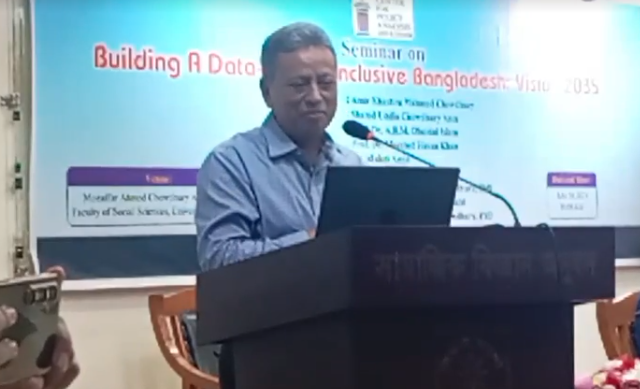News Flash

DHAKA, July 29, 2025 (BSS) – BNP Standing Committee member Amir Khasru Mahmud Chowdhury today said country's development will remain only on paper and not in reality if a data-based, transparent and efficient administrative structure is not built.
“For this, political will and professionalism are the most important things,” he told a seminar in the Muzaffar Ahmed Chowdhury Auditorium of Dhaka University (DU) here.
Center for Policy Analysis and Reform organized the seminar titled “Information-Driven Inclusive Bangladesh: 2035 Vision” with DU Treasurer Professor M. Jahangir Alam Chowdhury in the chair.
BNP Joint Secretary General Shahid Uddin Chowdhury Annie, Bangladesh Open University (BOU) Vice Chancellor Prof Dr. ABM Obaidul Islam, BNP Mass Education Affairs Secretary and Member Secretary of the July-August Mass Uprising, Mourning and Victory Anniversary Celebration Committee formed by BNP Professor Morshed Hasan Khan, BNP Acting Chairman's advisers Dr. Mahdi Amin, Dr. S. M. Ziauddin Haider and Dr Rehan A Asad also spoke at the event, moderated by Professor Dr. Nazmul Hossain, Provost of Muktijoddha Ziaur Rahman Hall.
Professor M. Jahangir Alam Chowdhury and Professor Dr. Mohammad Noornabi presented the keynote papers in the seminar.
Amir Khasru underscored the importance of information in the country's development process saying in today's world, the more information one has, the more powerful he or she is.
However, there is still a clear weakness in adopting and implementing information-based policies in Bangladesh, he mentioned.
The BNP leader said now information is being used for political interests to hide the country’s real situation.
“The previous fascist government's attempt to increase the per capita income by deliberately showing the population number as low is not only a mistake, but also a deception with the future of the country,” he said.
As a result, questions have been raised about the credibility of data from important institutions like BBS, which is very worrying for a country's policymaking process, he said.
He underscored the need for making institutions stronger and independent for achieving sustainable development.
Especially in the capital market, financial sector and data collection process, professionalism and transparency are essential, he mentioned.
Khasru said the mismatch between long-term loans and short-term deposits in banks is a terrible signal for the economy.
He underlined the need for reducing the interference of government and ruling party in the capital market for its flourishing.
However, during the BNP era, no major corruption or scams occurred due to the appointment of professional people in Bangladesh Bank and the stock market, he said.
The BNP leader said digitalization is needed in the government, healthcare, education and investment sectors.
To stop the sources of bribery and corruption, digitization can play a vital to allow the people to get their services staying at home through digital platform, he said.
Prof Jahangir Alam Chowdhury said, "We have gained two important things from the July Revolution. One is to build Bangladesh as a discrimination free society. The other is to enrich the country economically. Building on this sacrifice of the martyrs, we want to see a new Bangladesh, which will be non-discriminatory, inclusive and developed."
He said the challenges facing Bangladesh in its path to becoming an upper-middle income country can be addressed if the BNP's 31 points can be coordinated with the SDG goals.
The SDG goals can be achieved only through the implementation of these 31 points.
BNP Joint Secretary General Shahid Uddin Chowdhury Annie said some circles in Delhi are plotting to create a new political force in Bangladesh.
BNP will identify these conspiracies and confront them through an information-based movement at the field level, he said.
Regarding reforms, he said, BNP has long ago drawn up an outline of good governance through 31-point reform proposal.
The biggest challenge of the future is combating corruption, establishing accountability and the rule of law, he said.
Annie pledged to face this challenge under the leadership of BNP Acting Chairman Tarique Rahman.
Mahdi Amin said a general consensus has been formed in Bangladesh that a legitimate government can be formed only through fair elections and establishing the people's right to vote.
If BNP gets the responsibility of running the country, the main foundation will be the announced 31-point reform plan, he said.
Dr. ABM Obaidul Islam said pre-requisite to sustainable development as well as national security is good governance and corruption-free administration.
But in Bangladesh, bureaucratic complexity, budget deficit in education and lack of reform are the root of all this, he said.